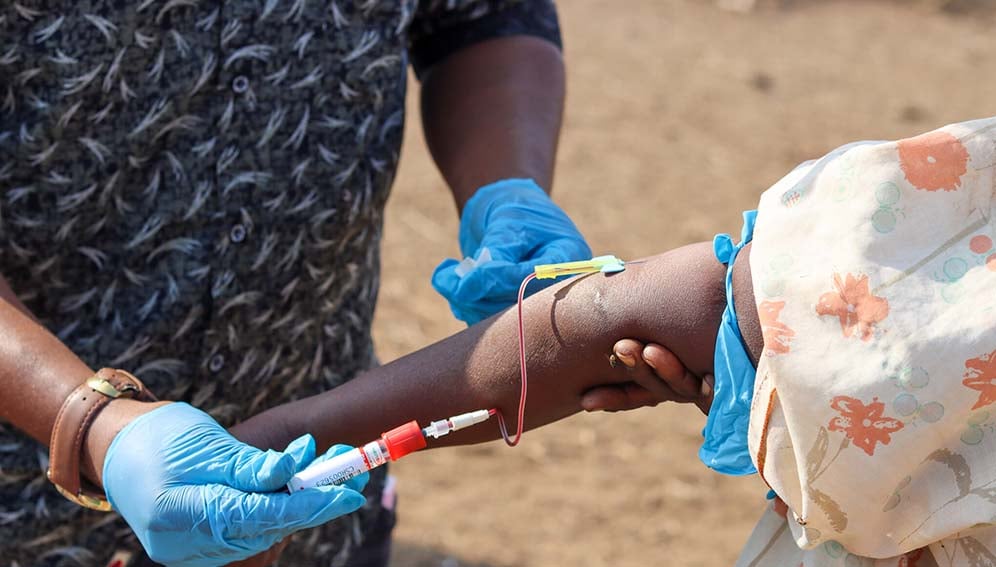23/10/25
Senegal steps up Rift Valley Fever response

By: Roger Kpeteka and Ruth Douglas
Send to a friend
The details you provide on this page will not be used to send unsolicited email, and will not be sold to a 3rd party. See privacy policy.
[DAKAR, LONDON, SciDev.Net] Senegal has launched a nationwide, multisectoral response to tackle a growing outbreak of Rift Valley fever (RVF), warning affected communities against risky self-medication.
The coordinated campaign brings together ministries of health, agriculture, environment, and water resources, and includes surveillance, mosquito control, and livestock vaccination efforts, officials announced at a press conference on Monday (20 October) in Dakar.
“This is a disease that lies at the crossroads of human, animal, and environmental health, and therefore requires a collective response,” said Minister of Health and Social Action Ibrahima Sy.
“We strongly advise against self-medication, as certain medicines, particularly anti-inflammatories sold in markets, can aggravate the situation.”
Boly Diop, head of Senegal’s National Incident Management System (SGI)
He said the government has activated epidemic management committees across the country, increased treatment and case detection, and rolled out vaccination campaigns for livestock, since the outbreak began in September.
Mosquito control operations are in place in high-risk areas, according to the minister, including destruction of breeding sites, use of impregnated mosquito nets, and deployment of drones to identify stagnant water sources.
A communication campaign in local languages is underway to inform communities in markets, villages, and farming areas.
Authorities have intensified surveillance in the most affected regions: Saint-Louis, Matam, Louga, Thiès, and Tambacounda.
“These combined efforts have slowed the spread of the epidemic, but vigilance must remain high,” said Sy.
Human and animal impact
As of 20 October, the Ministry of Health had tested 1,657 samples, confirming 258 human cases. Of these, 21 resulted in death, while 192 patients have recovered.
There were 57 confirmed cases in animals, while authorities say more than 14,000 animals have been vaccinated.
According to Boly Diop, head of Senegal’s National Incident Management System (SGI), specialised working groups have been formed to inform decision-making, bringing together experts in zoonoses, diseases that spread between animals and humans.
Health officials say the combined efforts of the ministries and technical teams have slowed the spread of the epidemic, enabling rapid detection of cases and early treatment of severe forms of the disease.
Self-medication
However, Diop warned that self-medication and delayed medical consultations have contributed to several deaths.
He said: “We urge the population to be vigilant. Anyone showing symptoms should seek medical care immediately.
“We strongly advise against self-medication, as certain medicines, particularly anti-inflammatories sold in markets, can aggravate the situation.”
Investigations carried out by SGI teams in the north of the country found that several deaths were linked to late hospital admission and complications from self-medication.
“Some died from haemorrhaging, others from organ failure,” said Diop.
“The findings show that several patients arrived at the hospital too late. This confirms once again that self-medication is one of the main causes of the worsening of the viral form of the disease.”
Disease transmission
RVF is primarily transmitted by mosquito bites or through direct contact with infected animals. It is not transmitted between humans, Senegal’s health ministry stressed.
“There is no vaccine for humans, but there are effective vaccines for animals,” said Diop, highlighting the importance of prevention measures.
Mawlouth Diallo, an entomologist at the Pasteur Institute of Dakar, said vaccination efforts were being prioritised in livestock markets, at water points, and along routes where livestock are moved to graze.
“Some of these animal vaccines have been available in Senegal for a long time,” said Diallo.
“Now that there is an epidemic, targeted vaccinations will be carried out in certain areas.”
Research priorities
The UK Health Security Agency convened an open scientific consultation last week (14 October) in collaboration with global and African health institutions, to identify research priorities to support the outbreak response in Senegal.
Disease specialists at the online meeting said more point-of-care diagnostic tests were urgently needed to manage the disease more effectively.
Emmanuel Agogo, director of the pandemic threats programme at FIND, a non-profit that aims to spur diagnostic innovation, said data analysis by the organisation on the availability of commercial diagnostics tests for RVF found “huge gaps in point-of-care tests”.
PCR tests, which require samples to be analysed in a laboratory, are currently being used to diagnose suspected cases in Senegal and elsewhere.
However, lateral flow and antigen tests, which give results without the need for specialist laboratory equipment, are lacking, said Agogo.
“Overall… tests on the market were very limited,” he said.
“We have quite a few lab-developed tests that are available, but when it comes to LFAs (lateral flow assays) or antigen tests, pretty much nothing,” he told the meeting, adding that there were no new tests currently being developed.
Moussa Diagne, a virology researcher at the Pasteur Institute of Dakar, echoed these concerns.
“RVF hits rural areas … so, what we need is true point-of-care tools,” he told the meeting.
For Diagne, continued genomic monitoring is crucial. “That is key to keeping assays updated, which is what we have done for this outbreak, at IPD, to make sure that we are updated in terms of sensitivity and specificity,” he added.
One challenge in responding to the disease is keeping veterinarians safe and ensuring strict biosafety conditions are met to stop the disease spreading.
In Uganda, researchers have developed “mobile labs” with a specially designed “glove box” to improve biosafety, according to Stephen Balinandi, a researcher at the Uganda Virus Research Institute.
“It’s a small box, it can provide a safe environment, it doesn’t require a lot of training and actually with it you don’t really need a lot of PPE (personal protective equipment),” he said.
“In our situation we’ve been able to address the issue of biosafety at the community level using that glove box.”
This piece was produced by SciDev.Net’s Sub-Saharan Africa French desk.


